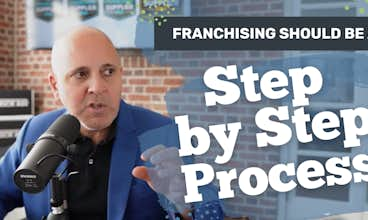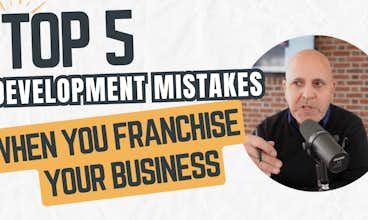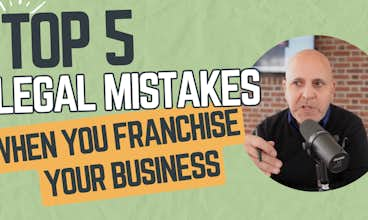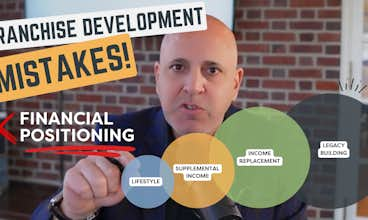Franchise Business Plan
The key to developing a successful franchise business plan is keeping it dynamic, data-centric and growth-oriented.
If you’re an entrepreneur considering franchising your business, you’re probably wondering whether you should create a business plan for your new brand.
The short answer is that every franchisor should have a detailed business plan. However, what that plan looks like is probably very different from what most emerging franchisors initially imagined. Rather than a static, one-size-fits-all document with boilerplate language, a successful franchise business plan is dynamic and tailored to your business – allowing you to stay true to your vision while remaining flexible in your approach to achieving your goals.
In this article, we’ll explore best practices for creating a dynamic franchise business plan that can allow your brand to scale over time without limiting its ability to change and grow.
Start with an Honest Franchise Assessment
When creating your new franchise business plan, leaving room for growth is critical. Because your brand’s needs will change over several years in business, it’s important to start with an honest evaluation of your franchise offering while avoiding the generic templates and boilerplate language that many franchise developers are prone to using.
Instead, consider addressing the following factors as you develop a custom business plan that’s tailored to your brand:
Define your goals. What are your short- and long-term goals as a franchisor? How do you want to grow and scale your business over time?
Assess your industry position. Is your franchise a novel industry leader, or is your market oversaturated with competition? Knowing your brand’s industry and brand position is critical for developing a franchise sales plan that works.
Evaluate your offering. What are the unit economics of your franchise system? What differentiates your brand from competitors? What can you offer franchisees that similar offerings can’t? What is your ROI for franchisees? How is the market responding to your offering?
Identify your values. What are your brand’s core values? How will you recruit good-fit franchisees whose goals and values align with yours?
Analyze your capital. Does Item 19 of your Franchise Disclosure Document (FDD) tell a compelling financial story about your business? How much capital can you afford to invest in developing your franchise system? Are your franchise sales goals realistically aligned with your brand’s budget?
Leave room for evolution. Can your business plan react and adapt to your brand’s changing needs over time? Make sure to leave room in your business plan for growth and improvement.
As a new franchisor, timing is also important when creating a successful business plan. For most new and emerging franchisors, the best time to develop a detailed business plan is during your first year in business.
Know the Steps to Franchising a Business
After you’ve determined that your business is ready to franchise, it’s critical not only to understand, but also to own, the steps to franchising your business. It’s also a good idea to work directly with an experienced franchise attorney when franchising your business, as many of the steps to franchising a business require legal compliance and know-how.
Franchise Disclosure Document
An important legal document, the FDD is required to offer and sell franchises in all U.S. states. Because its contents are mandated by the Federal Trade Commission’s Franchise Rule, the FDD should be prepared by a knowledgeable franchise attorney.Franchise operations manual
An important business document that is provided to every franchisee, your operations manual is the blueprint for your franchise system. Although every operations manual is unique and will change over time as the business matures, some common topics it addresses include the brand’s vision and mission, steps for opening a franchise location, information about products and services, inventory and vendor information, operations standards, marketing and other requirements.Trademark registration
Franchise systems revolve around trademarks, including brand names and logos, which are typically licensed to franchisees. It’s important that your franchise trademarks are properly registered with the U.S. Patent and Trademark Office to protect your brand before offering your first franchise.Establish a franchising entity
Although you likely already own a small business, it’s important to establish a legal franchisor entity when franchising. This separate company will be in the business of selling franchises, supporting franchisees, and collecting royalties and other revenue related to your franchise system.Register your FDD
In some states, including the Franchise Registration States and franchise filing states, you must register and file your FDD with the state regulator before legally offering or selling franchises in those locations. Because this step requires legal compliance that differs from state to state, it’s best to work with a seasoned franchise attorney to determine where you are legally required to register your FDD.Create a franchise sales strategy and budget
Before you start offering and selling franchises, it’s important to evaluate your capital and set a realistic budget for your new franchise system. Make sure to consider the costs associated with daily operations, as well as marketing, recruiting, your discovery process and more. It’s also important to develop a franchise sales strategy that will attract qualified franchise buyers who are a good fit for your brand.
Although many franchise development firms promise to provide legal advice and documents when franchising their clients’ businesses, some only use boilerplate legal documents that fail to account for the unique risks faced by franchise systems in different locations and industries – a mistake that can have costly legal consequences down the road.
Because the steps to franchising a business require compliance with federal franchise laws and local state regulations, it’s important to work directly with an experienced franchise attorney when franchising your business. By establishing a rock-solid legal foundation for your brand, you can limit your exposure to legal liability in the future.
Launch Your Franchise Organically
Although every franchisor’s goals vary depending on their business and industry, it’s important to develop a five-year success plan early on. As a new franchisor, you should expect to spend your first year as a franchisor seasoning and building your franchise organically.
When launching your brand, consider the following best practices:
Develop a marketing strategy. Make sure your website and marketing materials tell a compelling story about your brand and differentiate your offering from the competition. Organic franchise development also often utilizes social media and word of mouth from family, friends and brand evangelists who are enthusiastic about buying a franchise and investing in your business.
Target good-fit franchisees. Successful franchise sales depend on the ability to attract qualified franchisees whose goals align with yours. Make sure your franchise marketing materials communicate the unique differentiators that set your offering apart from competitors.
Over-support your first franchisees. Validation is critical to franchise success, so it’s important to over-support your first franchisees and ensure they’re set up for success from Day One.
Monitor feedback. Utilize real-world data to monitor the market response to your brand, and take feedback from customers and franchisees seriously. By continuously improving your systems and processes, you can set your new franchise on the path to success early on.
Once you’ve grown your brand organically during its first year in business, you should expect to spend the following two years focused on increasing unit economics and franchisee validation. Finally, plan to spend years four and five focusing on acceleration and growth.
Develop a Dynamic 12-Month Planning Process
As a successful entrepreneur, it’s important to remember that franchising is a journey – not just a destination. In addition to your five-year success plan, developing a 12-month dynamic planning process for your new franchise can help bring your vision to life while keeping you focused on your obligations as a franchisor. During that period, it’s important to look for ways to avoid mistakes that can lead to bad business outcomes – including some common errors that inexperienced franchise developers sometimes make.
Consider the following goals when planning out your first year in business:
Quality data tracking. What methods will you use to track high-quality data and information accurately to improve your sales and operations over time?
Networking. As a new franchisor, attending conferences, workshops and industry events can connect you with experts and other professionals who can help you grow.
Education. Ongoing business education is critical for success in the franchising industry. Plan to attend seminars, workshops and other educational events to learn and grow as a franchisor.
Franchise brokers. Although you might not be on their radar during your first year as a franchisor, franchise brokers can help you scale later. Because of that, it can be a good idea to incorporate a strategy for connecting with them as you grow your brand.
As a new franchisor, it’s important to make room for growth when developing your franchise business plan. By allowing yourself enough latitude to learn from mistakes and improve your systems and processes over time, you can hit the road running from the very beginning.
If you’re ready to create a dynamic franchise business plan for your new franchise, our team can help. Contact us today!








